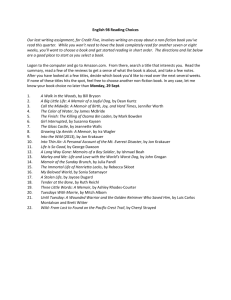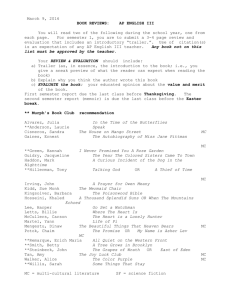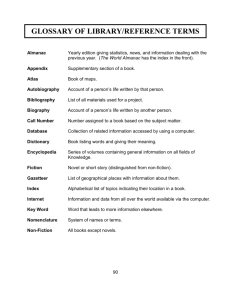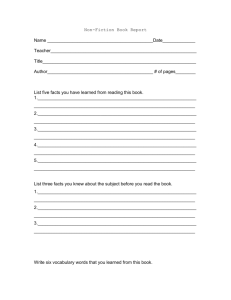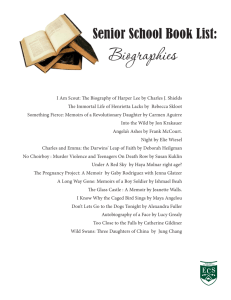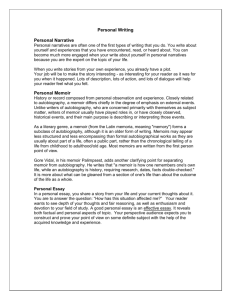Non-Fiction Literature Circle Text Choices
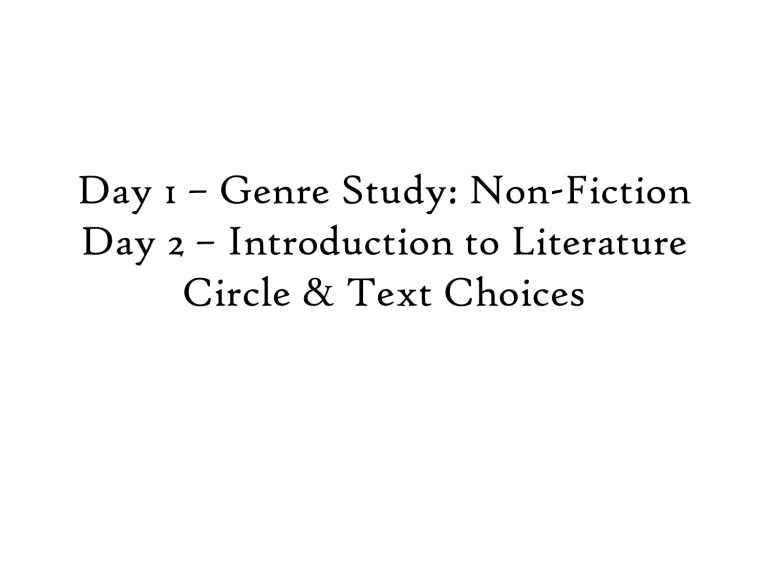
Day 1 – Genre Study: Non-Fiction
Day 2 – Introduction to Literature
Circle & Text Choices
Follow these directions
:
1. Get your reading folder.
2. Pick up a non-fiction genre chart from my green stool.
3. What do you know about the non-fiction genres? Fill in the chart with pencil .
Genre
Prose
Poetry
Fiction
Non-
Fiction
Non-Fiction
• “Not-fake” (a.k.a. REAL)
• Non-Fiction texts will have:
– Real people (not characters)
– Real events & conflicts
– Real places (not settings)
– Facts
– Information
• Most common Author’s Purposes: to inform or to persuade
Genre
Prose
Poetry
Fiction
Non-Fiction
Biography
Autobiography
Memoir
Informational
Self-Help
Biography
• Bio = life
• Graph = written
• True story of a person’s entire life
(birth to death/present)
• Written by another author; subject is usually famous.
• Third person point of view
(personal pronouns “he” and “she”)
• Ex: Charles and
Emma by Deborah
Heiligman
Autobiography
•
•
Auto = self
• Bio = life
Graph = written
• True story of a person’s entire life
(birth to present)
• First-person point of view
(personal pronouns “I”,
“me”, and “my”)
• Ex: Miles to Go by Miley Cyrus
• The subject of the book and the author are the same person
Memoir
• Think: memory
• Chunk of a person’s life story, but not entire life story
• Ex: Marley and Me by John Grogan
• Usually about a unique, traumatic, or life-changing event
• First-person point of view
Informational
• Author’s Purpose: to inform; a reader should be able to gain information about a topic.
• SO MANY topics: sports, history, politics, environment, etc.
• Factual
• Uses text features such as graphs, charts, pictures, etc. to give information.
• Ex: An Inconvenient
Truth by Al Gore
Self-help
• Author’s Purpose : to persuade; to give advice or help a reader improve
• Ex: 7 Habits of Highly
Effective Teens by Sean
Covey
• Often written in second person point of view
(personal pronoun “you”)
• SO MANY Topics: health, weight-loss, love, happiness, jobs, etc.
Someday List
Spend time adding NON-FICTION titles to your Someday List.
Follow these directions...
1. Get your literary notebook.
2. Set up a Type 2.
Type 2:
Compare and contrast BIOGRAPHY,
AUTOBIOGRAPHY, and MEMOIR.
Biography
Autobiography Memoir
Introduction to Literature
Circles
Our new reading unit for the month of
February!
Literature Circles
• Small groups of students.
• Each group reads and discusses a piece of literature.
• Discussion is guided by students' response to what they have read.
• Each student will have a job that will guide their reading.
• Reading is done outside of school and during
Reading Workshop time.
• All of the book choices for this literature circle unit will be non-fiction.
Literature Circles Roles
• Discussion Director - develops questions for the group to discuss; leads discussion during group meetings
• Summarizer - prepares a brief summary of the passage read that day
• Word Wizard- chooses words that are difficult or used in an unfamiliar way
• Connector - finds a connection between the story and another book, event in their personal life or the outside world
• Passage Master - chooses a selection that the group rereads and discusses because it is interesting, informative, the climax, well-written, etc.
Literature Circles Roles
• Discussion Director - develops questions for the group to discuss; leads discussion during group meeting.
• Summarizer - prepares a brief summary of the passage read that day.
• Passage Master - chooses a selection that the group rereads and discusses because it is interesting, informative, the climax, well-written, etc.
• Connector - finds a connection between the story and another book, event in their personal life or the outside world.
• Word Wizard- chooses words that are difficult or used in an unfamiliar way and defines them.
• Investigator – researches an important concept, event, person, etc. that would help add to your understanding of the book.
How will I be graded in this unit?
Requirements:
1. Brought book to every meeting.
Points possible = 4
A
Always Sometimes Rarely Never
B C D E
2. Brought a completed job sheet to every meeting.
Points possible = 4
3.Job sheets were completed with effort.
Points possible = 20
4. Focused, productive member of group discussions.
Points possible = 12
In addition...
A Summative Assessment
Loaded Question #3 on your literature circle book.
Period 1
Three book choices
Guts
by Gary Paulsen
• Gary Paulsen “spills his guts” in this memoir about his life as a child and young adult.
• Paulsen shares experiences from the great outdoors of Minnesota, Alaska, and Canada.
He also talks about close encounters with wildlife, racing his sled dogs, practicing for an Iditarod, and hunting when he was a kid.
• If you have read the Hatchet series by
Paulsen, you will find yourself making many text-to-text connections.
Soul Surfer
by Bethany Hamilton
• Bethany Hamilton tells the story of her shark attack at the age of thirteen.
• Despite her handicap, Bethany perseveres to follow her dream of becoming a pro surfer.
• This is a memoir of inspiration and courage.
Marley: A Dog Like No Other
By John Grogan
• Maybe you saw this title from a recent movie, but you haven’t read the book?
Well, now is your chance to read this famous memoir of a puppy and his owner.
• John Grogan tells about his many adventures of having a yellow lab puppy,
Marley, who never behaves.
• This book is both humorous and sentimental.
Period 1…
Make your book choices
1. Guts by Gary Paulsen
2. Soul Surfer by Bethany Hamilton
3. Marley: A Dog Like No Other by
John Gorgan
Period 2 & 6:
Three book choices
Soul Surfer
by Bethany Hamilton
• Bethany Hamilton tells the story of her shark attack at the age of thirteen.
• Despite her handicap, Bethany perseveres to follow her dream of becoming a pro surfer.
• This is a memoir of inspiration and courage.
Of Beetles and Angels
by Mawi Asquedom
• When he was four years old, Mawi's family left their war-ravaged home in Ethiopia.
• They spent three years in a Sudanese refugee camp before coming to the U.S. in 1983, where they were settled by World Relief in a wealthy white suburb near Chicago.
• He later earned a full scholarship to Harvard, where in 1999 he delivered the commencement address. This autobiography tells about this amazing journey.
• If you enjoyed the silly stories of the Watson family from The Watsons go to Birmingham, you will enjoy learning about this family’s struggles and joys.
Three Cups of Tea
By Greg Mortenson
• This is a memoir of how one act of kindness can lead to another.
• In 1993, while climbing one of the world's most difficult peaks, Greg Mortenson became lost and ill, and eventually found aid in the tiny Pakistani village. He vowed to repay his generous hosts by coming back to build a school.
• Greg Mortenson goes on to build MANY more schools for kids in need in the
Middle East.
Periods 2 & 6:
Make your book choices
1. Soul Surfer by Bethany Hamilton
2. Of Beetles and Angels by Mawi Asgedom
3. Three Cups of Tea: The Young Readers
Edition by Greg Mortenson & David
Oliver Relin
Period 5 & 7
Four book choices
The Omnivore’s Dilemma
By Michael Pollan
• Do you know where your food comes from? Do you know which cow produced the milk you used in your morning cereal? Or better yet, do you know what that cow ate that is now, consequently, in you?
• In this informational book, Michael Pollan sets out to find the secret lives of our food. Pollan has done an amazing amount of research to write this “eater’s guide,” but don’t worry, Pollan delivers his knowledge through stories and humor.
• You will learn about simple actions that will improve the health of your bodies, our society, and our planet
Revenge of the Whale
By Nathaniel Philbrick
• Philbrick tells the true story of the Nantucket whaleship Essex, which sank in the Pacific in
November 1820, after being deliberately rammed twice by an enraged sperm whale.
• Three months later, five emaciated men were rescued from two small boats filled with the bones of their unlucky companions.
• This historical tale of the whale's attack on the Essex gave Herman Melville the idea for the climactic scene in his classic novel Moby-Dick.
• The story of the Essex crew is a compelling saga of desperation and survival that will appeal to young people. The grisly details of cannibalism necessary to the telling of the story may provoke shivers but should not give anyone nightmares.
Three Cups of Tea
By Greg Mortenson
• This is a memoir of how one act of kindness can lead to another.
• In 1993, while climbing one of the world's most difficult peaks, Greg Mortenson became lost and ill, and eventually found aid in the tiny Pakistani village. He vowed to repay his generous hosts by coming back to build a school.
• Greg Mortenson goes on to build MANY more schools for kids in need in the
Middle East.
Of Beetles and Angels
by Mawi Asquedom
• When he was four years old, Mawi's family left their war-ravaged home in Ethiopia.
• They spent three years in a Sudanese refugee camp before coming to the U.S. in 1983, where they were settled by World Relief in a wealthy white suburb near Chicago.
• He later earned a full scholarship to Harvard, where in 1999 he delivered the commencement address. This autobiography tells about this amazing journey.
• If you enjoyed the silly stories of the Watson family from The Watsons go to Birmingham, you will enjoy learning about this family’s struggles and joys.
Periods 5 & 7:
Make your book choices
1. The Omnivore’s Dilemma: The Young Readers
Edition by Michael Pollan
2. Revenge of the Whale by Nathaniel Philbrick
3. Three Cups of Tea: The Young Readers Edition by
Greg Mortenson & David Oliver Relin
4. Of Beetles and Angels by Mawi Asgedom
Tomorrow’s Schedule
• You will meet your group members and your book choice will be revealed.
• You will create a schedule for your reading.
